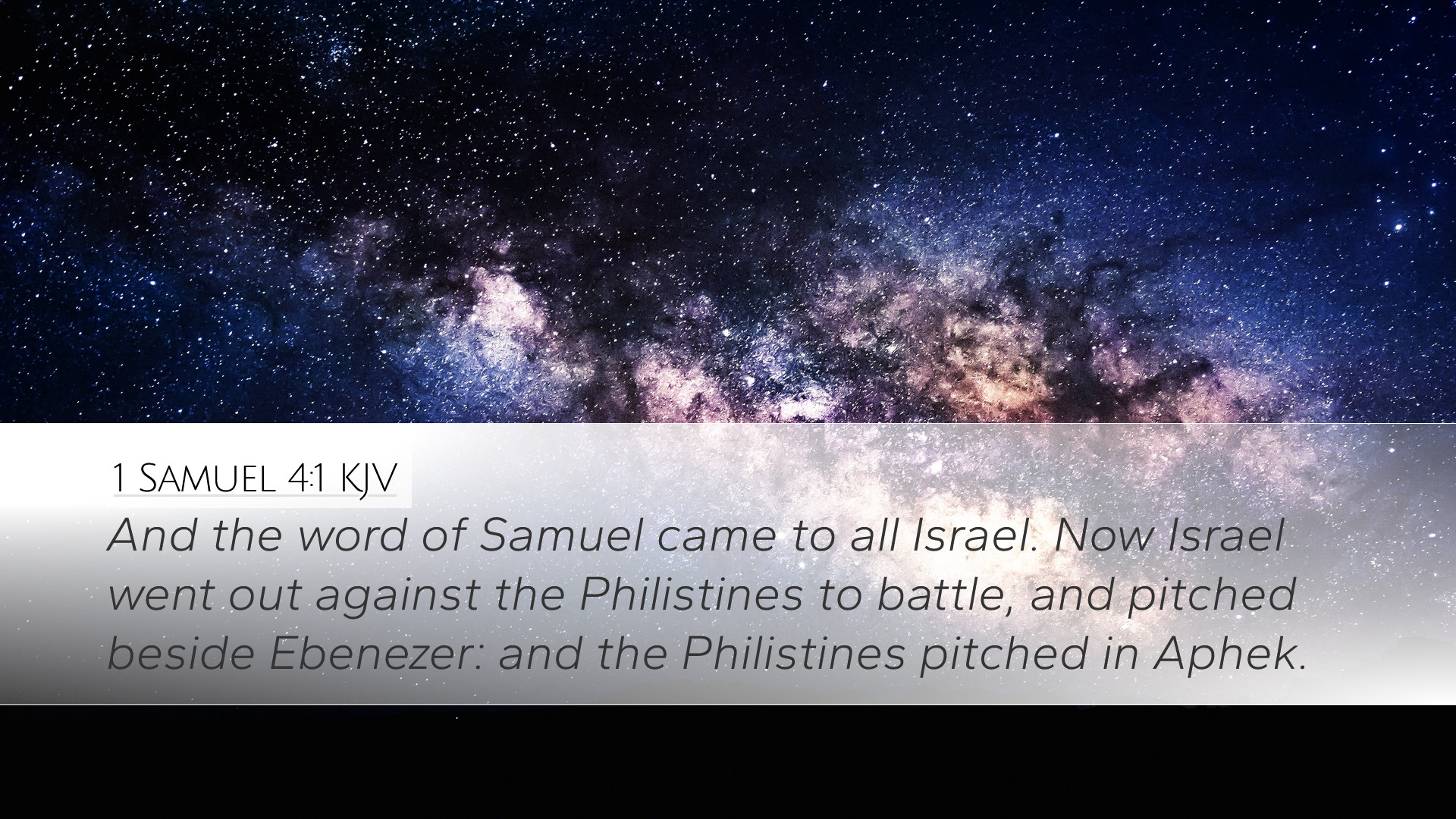Commentary on 1 Samuel 4:1
Verse Reference: 1 Samuel 4:1 - "And the word of Samuel came to all Israel. Now Israel went out to battle against the Philistines, and encamped beside Ebenezer; and the Philistines encamped in Aphek."
Introduction
The context of 1 Samuel 4:1 marks a significant moment in Israel's history. This verse sets the stage for a complex interplay of divine instruction, national identity, and military conflict. It highlights the prophetic authority of Samuel, while depicting the spiritual and moral state of Israel prior to the impending battle. By looking into the insights of renowned commentators such as Matthew Henry, Albert Barnes, and Adam Clarke, we can glean a deeper understanding of the implications of this verse.
Contextual Analysis
Israel's conflict with the Philistines is not merely a physical confrontation; it symbolizes broader spiritual themes. As they prepare for war, the leadership of Samuel emphasizes the importance of divine guidance and the nation's covenant relationship with God.
According to Matthew Henry, the phrase "the word of Samuel" indicates the role of prophecy as a guiding light for Israel. It serves as a reminder that their successes or failures are deeply tied to their obedience to God's instructions and their adherence to His covenant.
The Role of Samuel
Albert Barnes notes that Samuel, having become a prophet and judge, represented a transitional phase in Israel's governance. His role was crucial as he conveyed God's messages to the people, guiding them not only politically but spiritually. The "word of Samuel" emphasizes his legitimacy and authority in a time when Israel needed strong leadership.
Furthermore, Adam Clarke elaborates on Samuel’s unique position, suggesting that he was not only a spiritual leader but also an intercessor for the nation. This relationship between the prophet and the people illustrates the importance of divine intercession in times of national crises.
Symbolism of Ebenezer
The location "Ebenezer" plays a significant role in understanding Israel's journey and spiritual struggles. According to Barnes, this name, which means "the stone of help," points back to the victory over the Philistines at Mizpeh (1 Samuel 7:12). The choice of this site serves as a poignant reminder of God's past faithfulness, yet it also implies a current dependence on Him for future deliverance.
Matthew Henry reflects on this duality, noting that while Israel celebrates God's previous help, they are now faced with a new challenge that tests their faith and reliance on God.
The Challenge of the Philistines
The upcoming battle with the Philistines presents a formidable challenge for Israel. Clarke emphasizes that the Philistines were not only a military threat but also represented spiritual opposition. Israel's battle was not merely against flesh and blood but a paradigm reflecting their struggle against sin, idolatry, and disobedience.
This theme of conflict highlights the need for repentance and a turn back to God, which is essential for victory. Henry comments on the importance of seeking God's favor as paramount in their efforts to defeat their enemies.
Lessons for Today
1 Samuel 4:1 offers modern readers a wealth of lessons. For pastors and theologians, it serves as a reminder of the continuous need for prophetic voices in the contemporary church. The contemporary equivalent involves listening to God’s leading through Scripture, prayer, and wise counsel.
- Listening to God: In a world filled with competing voices, the Israelites' reliance on Samuel’s word underscores the importance of discerning God’s guidance.
- The Importance of Remembering: As the Israelites recalled God’s past deliverance at Ebenezer, so too must believers recognize the faithfulness of God in their lives.
- Recognizing Spiritual Warfare: The battle against the Philistines is emblematic of the spiritual battles Christians face today, requiring vigilance and reliance on God.
Conclusion
1 Samuel 4:1 encapsulates a moment of both hope and tension within the narrative of Israel. As they stand on the brink of battle, the weight of their spiritual condition becomes evident. By drawing on the insights of Matthew Henry, Albert Barnes, and Adam Clarke, we gain greater appreciation for the dynamics of prophecy, obedience, and spiritual warfare. This scripture invites contemporary readers to reflect on their own reliance on God in times of uncertainty and challenge.


